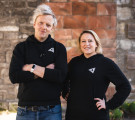Rapscallion Soda rebuilds new sustainable production facility following backing from prominent investor group

Ambitious independent Scottish craft soft drink producer, Rapscallion Soda has taken a series of important steps towards its goal of getting people drinking better tasting, healthier, and more sustainable soft drinks.
Born in 2016 as a pop-up in Glasgow, Rapscallion has built a UK wide fan base and proud reputation for creating premium sodas using the very best fresh produce to deliver plant based and super low sugar soft drinks with a modern twist.
Their product range showcases the best of what Scotland has to offer, sourcing the tastiest fruit picked at the peak of the season directly from farmers.
New equity backing from Scottish business leaders including Jamie Matheson, Robert Wiseman, and Hamish Grossart, alongside support from Scottish Enterprise and partners has enabled significant increases in output and sustainability.
Rapscallion’s production facilities in the Gorbals, Glasgow, have been comprehensively reengineered, with new machinery installed to ramp up capacity and provide an industry-leading reduced reliance on food grade CO2 by up to 65%.
The rapid expansion of the business has been aided by the recruitment of additional production machinery, a management team, and an experienced board of directors to support the founder, Gregor Leckie, in realising Rapscallion’s international ambitions.
Gregor Leckie said: “We are excited to have the backing of individuals with a proven track record of success and delighted with the support we have been granted from Glasgow City Council, Business Gateway Glasgow and Scottish Enterprise to help us reach our sustainable goals faster.
“We have completely transformed our production facility so we’re now electrically driven, powered by renewable energy and utilising direct air capture to reduce our environmental impact. This new machinery has allowed us to improve our core recipes and extend its shelf life to allow for export whilst remaining true to our ethos of extracting only the purest flavours from the freshest produce – whilst refusing artificial preservatives and concentrates.
“The drinks speak for themselves. We have a product designed for every palate and I am looking forward to developing the brand further afield. These are exciting times for Rapscallion.”
Scottish Enterprise’s Managing Director Rhona Allison said: “Rapscallion Soda continue to go from strength to strength and Scottish Enterprise and partners at Business Gateway and Glasgow City Council are delighted to have supported Gregor and his fantastic team to help them on their journey. The investment in low carbon, sustainable production facilities alongside the introduction of new staff and directors will see Rapscallion reach its full potential and scale up to take advantage of opportunities in the UK market and beyond.”
Dominic Dowling, Group Manager – Growth, Economic Development, Glasgow City Council added: “I am delighted that Glasgow City Council’s Business Growth Team has been able to support Rapscallion to grow and become more sustainable. Producing this independent craft soft drink in Glasgow will utilise the skills of the local workforce, whilst also creating additional employment opportunities. We are committed to supporting small and medium sized enterprises across Glasgow to achieve their growth aspirations and would encourage any Glasgow SME looking for support to contact us and I wish Gregor and the team at Rapscallion continued success for the future.”






